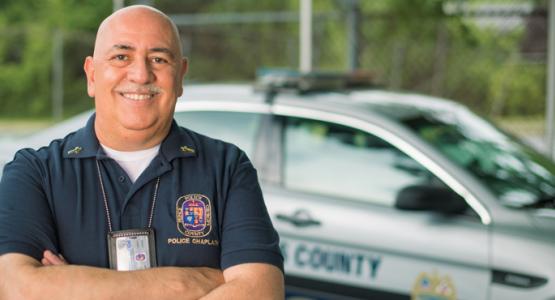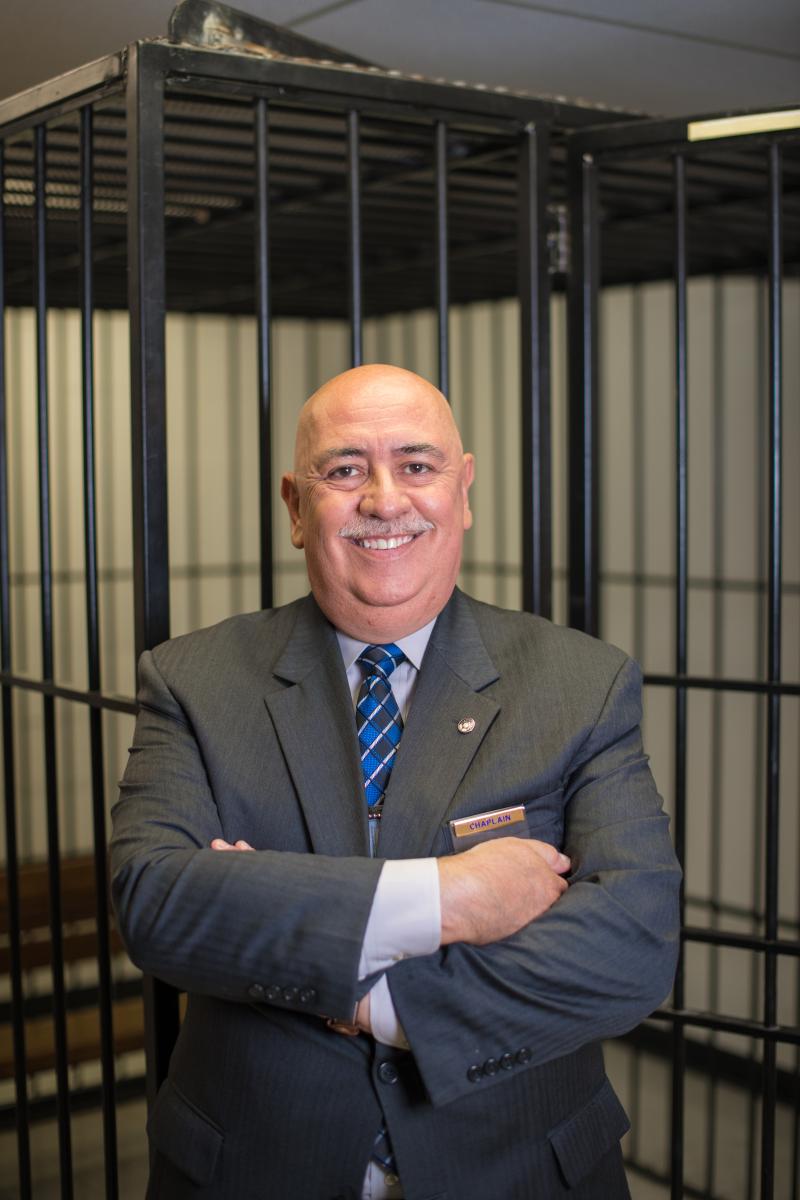
Part of the Family
 Story by Shannon Kelly / Images by Brad Barnwell
Story by Shannon Kelly / Images by Brad Barnwell
For 30 years, Claudio Consuegra has been a volunteer law enforcement chaplain. Consuegra, a member of Potomac Conference’s Beltsville (Md.) church, and the director of Family Ministries for the North American Division, has served as a chaplain in six states.
Consuegra currently serves the Prince George’s County Police Department in Maryland, but his journey as a chaplain began while he was pastoring in Oklahoma. The local hospital needed volunteer chaplains, and Consuegra decided to try it. Shortly after, he learned the police department was also looking for chaplains. “I went there, and immediately I fell in love with that type of ministry, and I’ve been doing it [ever] since,” he says. Consuegra is a member of the International Conference of Police Chaplains, and has been through a great deal of specialized training to become a police chaplain.
His work has led him to build meaningful relationships in many places with police officers. Riding in police cars with the officers allows him to provide a listening ear, counsel and camaraderie—a chance to serve the officers who serve him.
The work is not always pleasurable, however. Consuegra recalls serving in New York City following the tragedy of September 11, 2001. He was stationed at what was called “the pile”—rubble towering a reported seven to eight stories where the Twin Towers had stood tall only days before. “... The smells and the sights, it was not very pleasant,” he reflects solemnly. “I would work around the pile every single day, and stop to talk to the cops, firefighters, emergency personnel. ... It just gave me a greater sense of the work that we do, and a greater appreciation for the work they do.”
One of the hardest responsibilities Consuegra shoulders is delivering death notifications. He recalls one of his first death notifications, occurring in Waskogi, Okla. “This lady was bludgeoned to death in her home, and the cops were asked to go there to see why she wasn’t responding or answering the phone ... that’s when they found her dead, and so they asked the family to come to the station.”
He remembers delivering the sad news to three siblings that their mother had died. “The first one just about fell apart,” he recounts. “A few minutes later, the second one came, and she said, ‘I knew it! I knew it was going to happen!’ A few minutes later, the other one came, and he was very angry. [He] just wanted to punch walls.”
As police officers are not trained for this duty, Chaplain Conseugra takes the lead with an officer nearby for his protection, should someone react in anger and attempt to harm the bearer of bad news. Individuals react to the death of a loved one in a number of ways, ranging from rage to hysterics, and it is Consuegra’s job to remain with them in the wake of the notification to help them process the shock. At times a family member asks Consuegra to conduct a funeral for the deceased, particularly if the family does not belong to a church.
Despite its hardships, there is much to love about police chaplaincy. Consuegra considers one of the most rewarding parts of his job the bonds he forms with law enforcement officers. “There are some battle-hardened cops that you can’t get two words out of,” he notes. “After a while, they do begin to lower their defenses, and many of them become very, very open. When you finally gain their trust, police chaplaincy becomes very exciting because then you’re part of the family.”
Consuegra does not sugarcoat the realities of law enforcement, but he encourages those with the desire to choose this path. “Law enforcement chaplaincy is not for everybody,” he cautions. “You see the worst in society. At the same time, you see the best in society. It’s not for every pastor,” he concludes, “but it may be a wonderful blessing for those who choose to try.”
 Read and share these stories from the September 2018 Visitor:
Read and share these stories from the September 2018 Visitor:
- Don't Send Me to a Church!
- Just About Anything You Can Imagine
- No Lord. I Have Two Kids!
- Part of the Family
- Editorial: What Will Our Legacy Be?
- Pray for Separated Families
- Book Release: It's All About Jesus
- Book Release: Love in Pictures

Add new comment